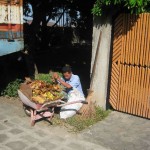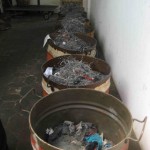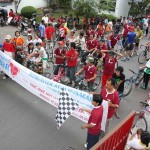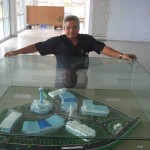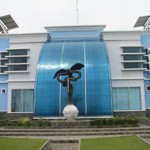The Akademi Tehnik Mesin Industri (ATMI)-Solo was established in 1968. Since then, ATMI has become the leading vocational-industrial (manufacturing and engineering) Polytechnic University in Indonesia and probably across Asia. At present, ATMI manages three main faculties, which are distributed among ATMI buildings on two campuses:
- Manufacturing (engineering)
- Mecatronics (mechanical and electronics)
- Machine-Design
ATMI-SMK Mikael (vocational high school) is a separate operation with its students’ apprenticeship course is in collaboration with ATMI.
ATMI recognises the importance of the environment and continues to integrate this to its daily operations and management schemes. During a visit of interested parties in August 2010 a further understanding was gained of the current environmental campus management initiatives. The group identified areas of interest where the Conference (JCAP) could gain a broader understanding by documenting, networking, and sharing the learnings and experiences with other Jesuit universities and the Association of Jesuit Colleges and Universities in Asia Pacific.
The institute develops the technical capacity of the youth and contributes to the technological advancement of the country. It communicates a respect for the dignity of human life as well as seeking to keep the ecological balance always looking for ways of greater reconciliation with creation.
ATMI Housekeeping, day-to-day Operations:
The Housekeeping Unit handles the day-to-day operations, which include cleaning (janitorial, waste management, gardening, and composting) and services (repairs, maintenance, and transportation) including electricity supply and maintenance. The following are the areas of interest to each unit seeking continued integration to broader planning and management framework of ATMI:
A system is set-up where leaf litter is collected and sacked everyday. Sacks of leaves are then brought to ATMI BizDec for composting. Leaves are decomposed through insulation process; enclosing the sacked leaves inside a drum does the insulation. The compost are used to fertilize ATMI’s maize and rice fields located at the back of the BizDec building.
Documenting the process from collection to composting, distribution and utilization is good for other university to learn.
Inside the campus, there is an effort to segregate wastes by assigning bins for biodegradable and non-biodegradable. These garbage’s bins are collected twice a day and then disposed in to an adjacent lot. It is proposed to have a clearer sorting station where individual bins for powder-paint, plastics, bottles, wood, rubbles, construction materials and others are assigned. Mapping the flow of wastes is important in order to know the actual steps and how they function so as to have accurate baseline data for designing waste management procedure.
Industrial wastes, on the other hand such as scrap metals from cutting and bending are collected and well segregated everyday for recycling by contractors. The proper disposal of powder-wastes from spray painting is still being explored. For the moment, these inert powder-wastes contribute to land fill but may have other recycling potential.
3. Drainage
As a response to the flooding concerns inside the campus, some cemented grounds in the campus and at the parking lot were removed to have better ground infiltration. A student initiated a project called biopori, which enable better ground infiltration inside the campus. Five deep bore holes of biopori is installed with a 4-meter deep pipe bored with 10 cm head exposed above the ground.
4. Energy
Considering that ATMI is a highly industrial institute, it demands high energy to maintain their machines and manufacturing units. Because of this, ATMI seeks to develop alternative ways on how to use energy as efficient as possible while keeping its high quality production. ATMI engages several companies that directly develop approaches to renewable energy.
5. Outreach and External Initiatives
ATMI engages on several ecological projects and initiatives within the province and beyond. The projects build capacity of community and local government on environmental management through:
People are basically dependent on motorbikes while others on cars. In ATMI, about 600 – 700 students everyday used motorbikes as against to 20 students using bicycles. To improve the awareness of people on having healthy human life and environment, the campus sponsors a “walk for a healthy environment” within the campus vicinity. This promotes awareness about the environment both in and off campus.
On a regular basis, members of ATMI sit down with RT (Rukun Tetangga) and RW (Rukun Warga) to discuss community concerns including the general beautification and peace and order matters in the area.
A monthly meeting with campus managers has been a venue for introducing the broader Jesuit Province’ concerns on alleviating poverty, preventing ecological and environmental destruction, and combating religious radicalism.
The ‘villa house’ is well positioned in the local community and by the dam for water irrigation. The resulting lake is silting up with a contribution also coming from the extensive fish pens in the water. People have thought of it as a possible ecological learning center as venue for students to learn about the ecology and the web of relations.
The design is ideal but needing redefinition in terms of possibly including an ecological park. The park could reflect local species and traditional paths with peripheral access to vehicles and motorbikes for reduce energy-use more valued use of space.
ATMI continues to build on the awareness of people about energy consumption and eventually influenced their habits and lifestyle. There is a continued effort to develop and strengthen alternative energy from wind and solar. ATMI seeks to develop technologies that assist communities and local government in terms of their livelihood and environmental programs. The principle is to provide alternative technology that maximises the use of resources while minimising the negative impacts on the local ecological systems and the global climate.


